Caring for your Dalmatian’s gastrointestinal health is a crucial part of ensuring they lead a happy and active life.
These distinctive dogs, known for their spotted coats and friendly disposition, require a diet that meets their specific nutritional needs to maintain a healthy digestive system.
Like all breeds, Dalmatians can experience digestive issues, which is why understanding and being proactive about their gastrointestinal health is important for every pet owner.
A balanced diet rich in nutrients and the right amount of dietary fiber is essential for Dalmatian digestive wellness.
Incorporating appropriate supplements can aid in digestive health, while regular exercise and stress management are fundamental in promoting overall gut function.
Additionally, being informed about common gastrointestinal disorders and dietary safety can help you prevent and address issues as they arise, ensuring your Dalmatian stays as healthy as possible.
Key Takeaways
- A balanced diet tailored to a Dalmatian’s needs is fundamental for digestive health.
- Supplements and a healthy lifestyle contribute to your Dalmatian’s gastrointestinal wellness.
- Awareness of digestive disorders and safety measures aids in preventative care.
Understanding the Dalmatian Digestive System
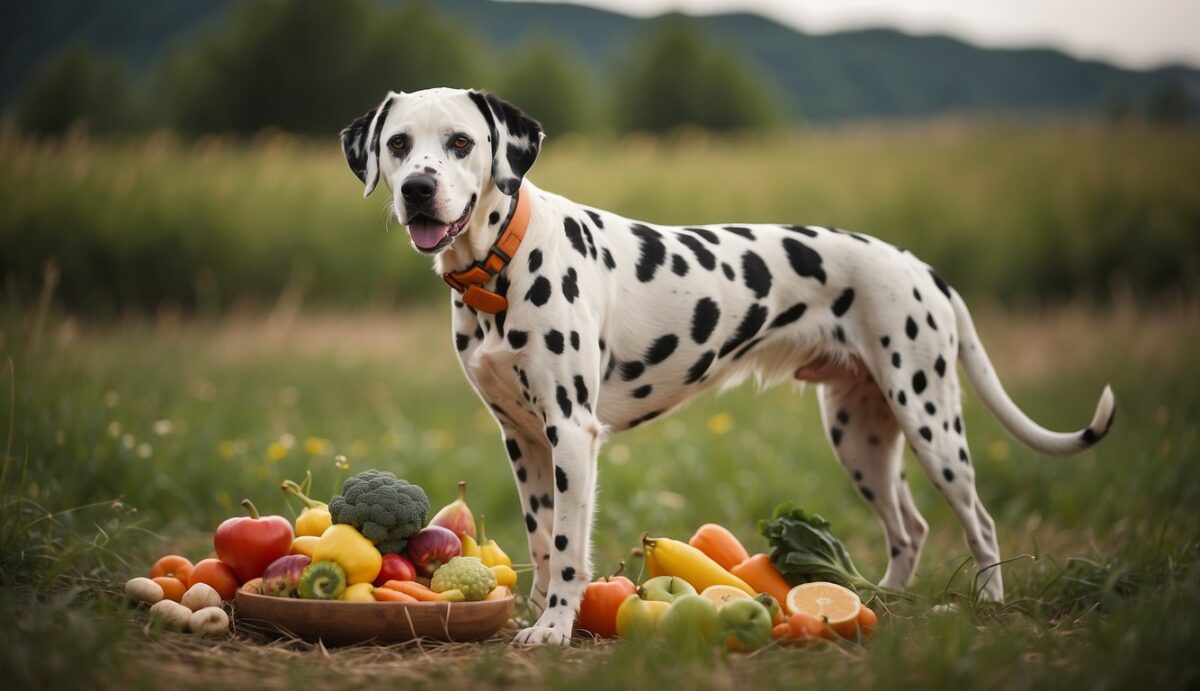
The health of your Dalmatian can be significantly influenced by their digestive system health. Let’s explore the specifics of what makes up their gastrointestinal tract, how the gut microbiome aids in digestion, and the common problems that may occur.
Anatomy of the Canine Digestive Tract
Your Dalmatian’s digestive tract starts at the mouth, where food is taken in and begins to break down.
From there, it passes through the esophagus into the stomach and then proceeds through the small and large intestines.
The pancreas and liver also play pivotal roles in your dog’s digestion, aiding in the breakdown of food and absorption of nutrients.
The Role of Gut Microbiome in Digestion
The gut microbiome consists of trillions of bacteria, some good and some potentially harmful.
In your Dalmatian, these microorganisms are essential for a healthy digestive system. They help break down food, produce vitamins, and protect against infections.
Balancing the gut microbiome is critical for your dog’s overall well-being.
Common Digestive Issues in Dalmatians
Dalmatians may experience various digestive issues, such as bloating, upset stomach, and gassiness.
These can often be traced back to their diet or a lack of routine. Ensuring regular feeding times and appropriate exercise can help regulate your Dalmatian’s digestive system and prevent uncomfortable conditions.
Nutritional Requirements for Dalmatians
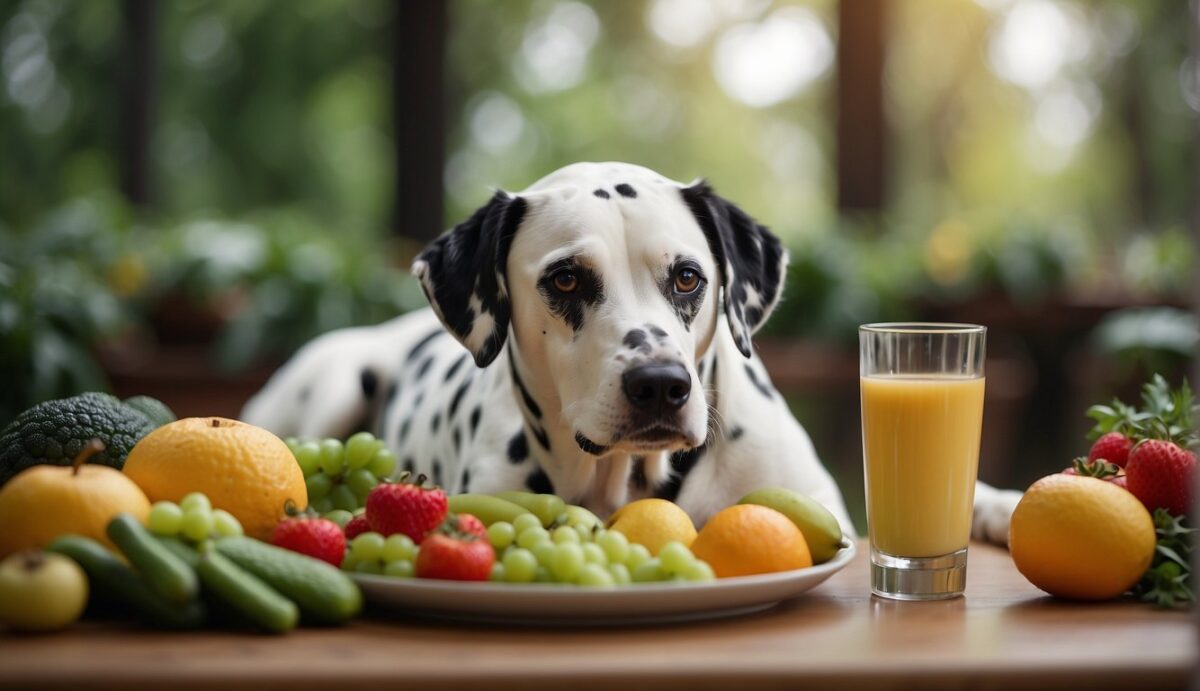
Optimizing your Dalmatian’s digestive health significantly depends on a carefully chosen diet that meets their specific nutritional requirements.
You’ll need to focus on a balanced diet, recognize high-quality proteins, and understand the role of carbohydrates and fiber.
The Importance of a Balanced Diet
To maintain your Dalmatian’s gastrointestinal health, a balanced diet is essential.
This diet should include a variety of nutrients such as proteins, carbohydrates, fats, vitamins, and minerals.
- Probiotics and prebiotics can aid in maintaining a healthy gut environment.
- Including vegetables, fruits, whole grains, and legumes offers a comprehensive spectrum of vitamins and enzymes that promote digestion.
Identifying High-Quality Protein Sources
Protein is a cornerstone of your dog’s nutrition, supplying the building blocks for muscle and tissue repair.
Opt for high-quality proteins that are easily digestible for Dalmatians:
- Chicken and fish are excellent protein sources, often fortified with omega fatty acids for additional health benefits.
- Avoid beef-based or liver-based foods, which may contain high levels of purines that aren’t suitable for Dalmatians.
Understanding Carbohydrates and Fiber Needs
Carbohydrates provide a key energy source for your Dalmatian, while fiber aids in digestion and nutrient absorption.
- Whole grains like brown rice and barley deliver sustained energy and are typically well-tolerated by Dalmatians.
- A measured intake of fiber-rich foods helps with stool quality and supports the entire digestive system.
- Introduce fiber slowly and monitor your Dalmatian’s response, ensuring a gradual adaptation to prevent gastrointestinal upset.
Dietary Supplements for Digestive Health
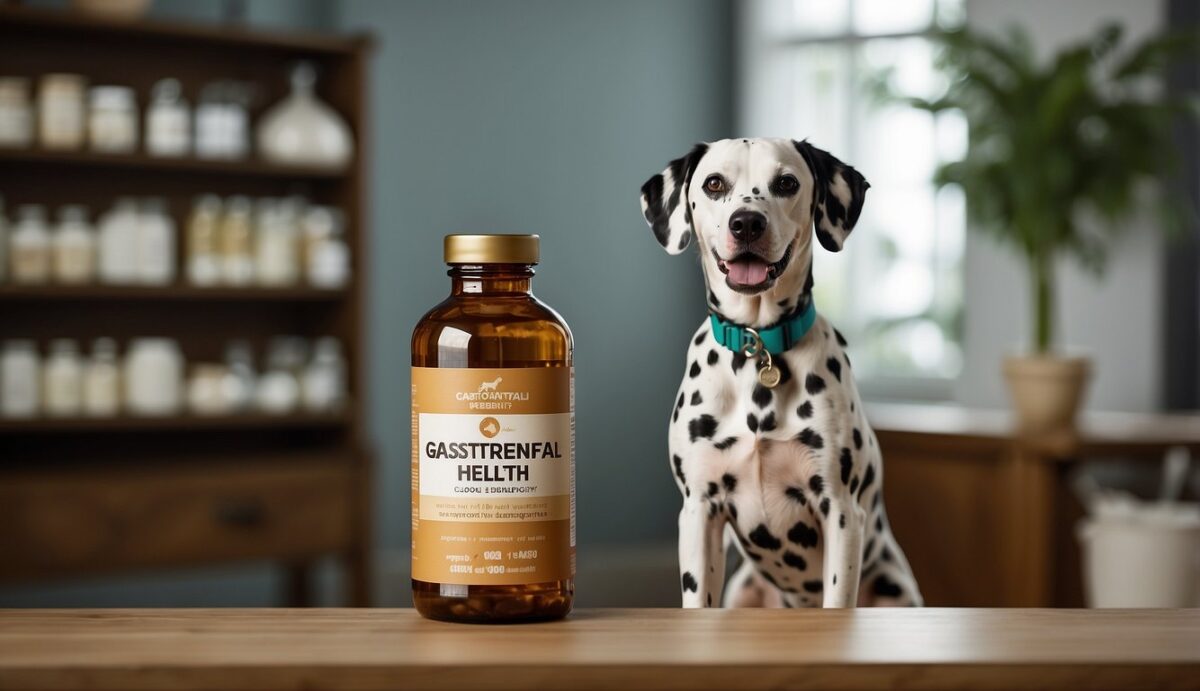
In maintaining your Dalmatian’s digestive health, you’ll find that certain supplements can be very beneficial. These supplements support gut health by promoting a balanced microbiome and aiding in the digestion of food.
Probiotics and Prebiotics for Dalmatians
Probiotics are beneficial bacteria that contribute to the healthy ecosystem of your Dalmatian’s gut.
These can be found in fermented foods like kefir, sauerkraut, and kombucha, or in high-quality dog probiotic supplements.
Including these in your dog’s diet can help maintain a robust digestive system.
Prebiotics, on the other hand, act as food for these beneficial bacteria.
Sources of prebiotics include ingredients like chicory root or inulin.
Together, probiotics and prebiotics help maintain the gut flora balance, which is critical for your Dalmatian’s overall health.
Enzyme Supplements for Enhanced Digestion
Sometimes, your Dalmatian might need a little extra help breaking down their food.
These enzymes facilitate the breakdown of proteins, fats, and carbohydrates, making it easier for your dog to absorb nutrients.
You can find enzyme supplements formulated for dogs, or add foods rich in natural enzymes like raw honey or fresh pineapple to their diet.
The Role of Omega-3 and Omega-6
Omega-3 and Omega-6 fatty acids are not just good for your Dalmatian’s coat and skin, but they also play a vital role in gut health.
These essential fatty acids help reduce inflammation, which can be beneficial for dogs suffering from gastrointestinal issues.
Flaxseed oil or fish oil supplements are excellent sources of these fatty acids. However, it’s important to maintain the right balance between Omega-3 and Omega-6, as an imbalance can lead to health issues.
Promoting a Healthy Lifestyle for Digestive Wellness
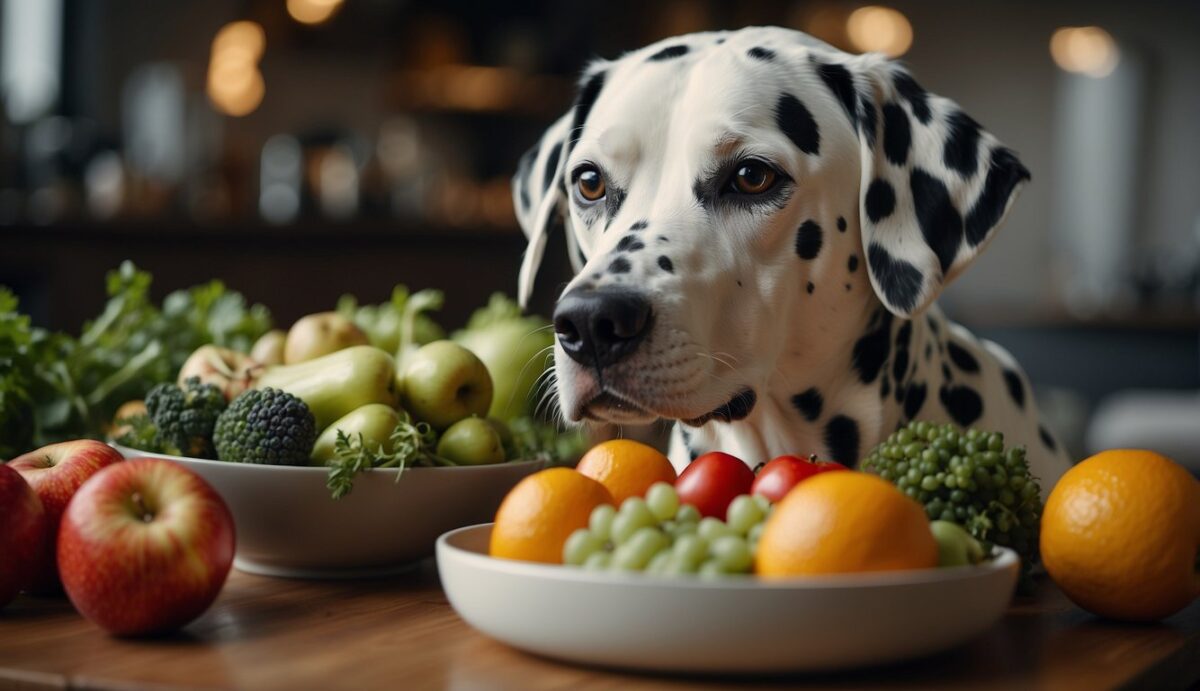
A healthy digestive system is paramount for your overall well-being, and there are specific lifestyle choices you can make to maintain it.
Regular exercise, managing your weight, and staying hydrated play crucial roles in supporting your gastrointestinal health.
Regular Exercise and Its Digestive Benefits
Incorporating regular exercise into your routine improves blood flow to all your organs, including the digestive tract, which can help maintain healthy digestive functions.
A daily practice like walking for at least 30 minutes can stimulate your intestines and curb constipation.
- Aerobic Exercise:
- Walking, jogging, or swimming increases your heart rate, which in turn encourages intestinal movements.
Managing Weight to Prevent Digestive Issues
Maintaining a healthy weight is essential to avoid unnecessary pressure on the abdominal cavity which can exacerbate digestive problems.
Consider the following for weight management:
- Balanced Diet:
- Ensure the inclusion of fiber-rich foods such as fruits and vegetables to support good bacteria in your gut.
- Portion Control:
- Eating smaller, more frequent meals to prevent overloading your digestive system.
The Influence of Hydration on the Digestive Process
Hydration is a key factor in digestive health, as water helps break down food so that your body can absorb the nutrients.
Drinking adequate water throughout the day aids in preventing constipation and supports overall digestive health.
Remember, your mental health can also impact your digestive system since stress and anxiety can disrupt digestive functioning.
Taking steps to manage stress through activities like yoga or meditation can therefore also contribute to digestive wellness.
Dealing with Digestive Disorders in Dalmatians
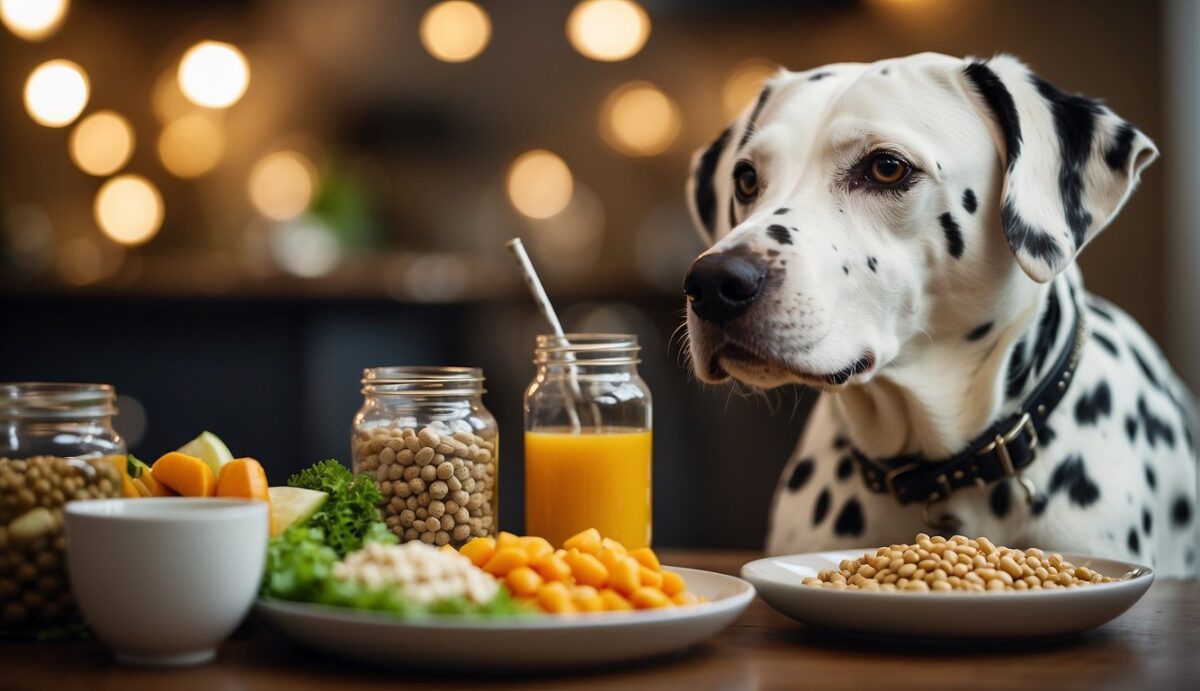
Your Dalmatian’s digestive health is crucial for their overall well-being. Managing disorders like IBS and IBD and preventing parasitic infections are key to maintaining a happy, healthy dog.
Irritable Bowel Syndrome (IBS) in Dogs
Irritable Bowel Syndrome (IBS) primarily affects your Dalmatian’s intestines, leading to symptoms like bloating, diarrhea, and occasional constipation.
Stress often triggers IBS, so keeping your dog’s environment calm and consistent is beneficial. A diet rich in fiber may help regulate bowel movements and support your dog’s gut health.
Inflammatory Bowel Disease (IBD) Management
Inflammatory Bowel Disease (IBD) is more serious than IBS as it involves chronic inflammation of the intestines.
Symptoms include persistent diarrhea, weight loss, and fatigue.
Veterinary care is essential; they may recommend:
- Dietary management: Hypoallergenic diets can reduce immune system reactions.
- Medication: Anti-inflammatory drugs like corticosteroids can control inflammation.
Preventing and Treating Gastrointestinal Parasites
Gastrointestinal parasites like worms can disrupt your Dalmatian’s digestive health, leading to diarrhea and bloating.
Regular deworming, as per your vet’s schedule, is crucial.
Good hygiene practices, such as cleaning up feces promptly and preventing your dog from drinking from stagnant water sources, reduce the risk of infection.
Keep your Dalmatian’s gut health at its peak by closely monitoring their diet, managing stress, and keeping up with regular veterinary check-ups.
Addressing issues early on is the best way to ensure a healthy digestive system.
Common Dietary Concerns and Safety Measures
In managing your Dalmatian’s gastrointestinal health, it’s imperative to pay attention to their diet while being aware of food intolerances and ensuring their safety by recognizing potentially toxic foods.
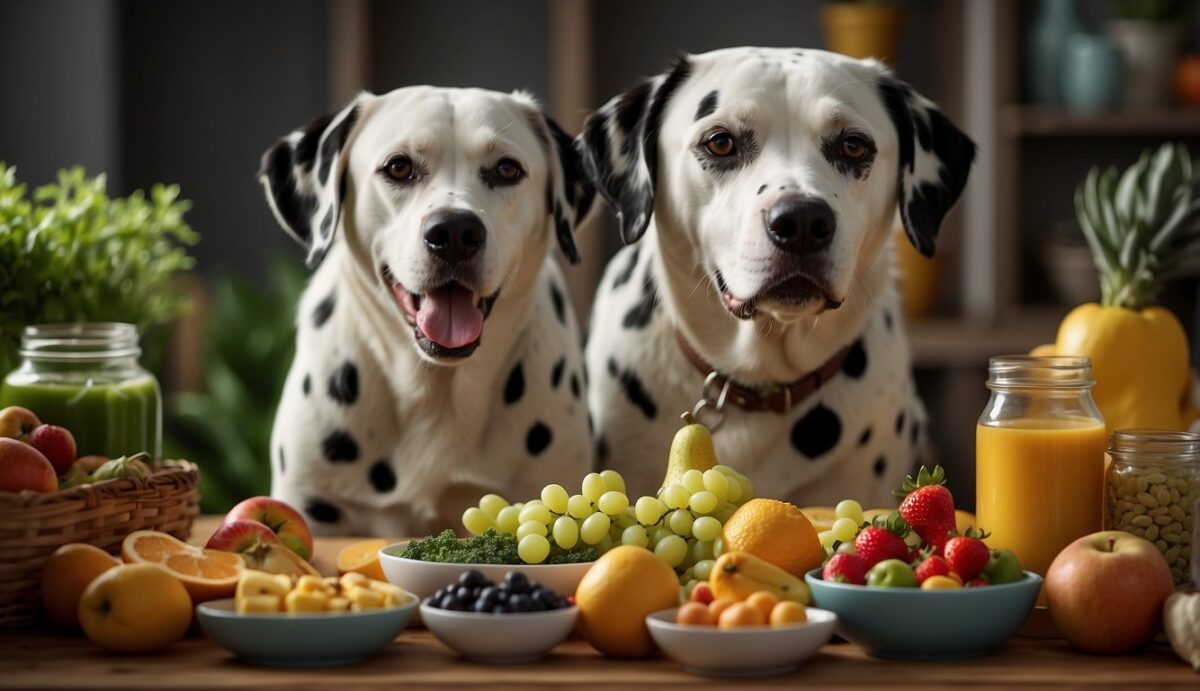
Identifying Food Intolerances and Allergies
Your Dalmatian may exhibit certain signs of food intolerance or allergies, such as abdominal pain, nausea, or digestive problems.
These reactions might stem from ingredients commonly found in processed foods or those high in saturated fat and cholesterol which are not aligned with their nutritional needs.
- Symptoms to Watch For:
- Frequent vomiting;
- Diarrhea;
- Gas; and
- Ear inflammation.
- Action Steps:
- Consult your veterinarian.
- Consider an elimination diet.
Avoiding Toxic Foods and Harmful Substances
As a pet owner, you must safeguard your Dalmatian from toxic foods and other harmful substances that could worsen their health.
Foods typical of a Western diet can be harmful to your Dalmatian’s digestive system.
- Common Toxic Foods:
- Chocolate
- Grapes and raisins
- Onions and garlic
- Prevention Tips:
- Store dangerous foods out of reach.
- Educate your family on which foods are unsafe.
Responsible Use of Medications and Antibiotics
When your Dalmatian requires medication, it’s crucial to use antibiotics responsibly, as improper use can lead to malabsorption issues and disturbances in the gut microbiota.
Additionally, excessive or inappropriate use of medications can provoke gastrointestinal discomfort.
- Guidelines for Medication:
- Only administer medications prescribed by your veterinarian.
- Monitor for signs of adverse reactions, such as changes in appetite or bowel habits.
- Considerations for Antibiotics:
- Understand antibiotics may disrupt your dog’s natural gut flora.
- Probiotics may be recommended to maintain a healthy digestive system during antibiotic treatment.
Home Remedies and Alternative Approaches

Exploring natural solutions can be a gentle way to support your digestive health. From natural supplements to homemade diets, these home remedies can help maintain and improve your gut health.
Natural Supplements for Digestive Health
Integrating natural supplements into your routine may support your digestive system.
Probiotics, like those found in yogurt, can enhance gut flora and immunity.
Foods rich in soluble fiber such as oats and bran are known to facilitate regular bowel movements and can be easily included in your daily meals.
- Supplements to Consider:
- Probiotic-rich yogurt
- Bran and oats for fiber
Both of these assist in sustaining a healthy balance of gut bacteria and can improve overall digestive function.
Incorporating Herbal Treatments and Essential Oils
Herbal teas can soothe indigestion and heartburn.
Options like ginger tea may reduce discomfort and improve digestion.
In the realm of essential oils, peppermint oil is often used for its relaxing effects on the gastrointestinal tract.
- Herbal Remedies:
- Ginger tea for indigestion
- Peppermint oil to alleviate gastrointestinal discomfort
Incorporating these treatments can also contribute to reduced anxiety and better sleep, both of which are linked to digestive health.
The Benefits of a Homemade Diet
Creating a diet from whole, homemade foods allows you to control ingredients and optimize gut health.
Incorporate bone broth to provide nutrients that support gut lining repair.
Fermented foods like sauerkraut and kimchi are excellent for boosting good bacteria in the digestive system.
- Foods for Gut Health:
- Garlic and bone broth for nutrient support
- Sauerkraut and kimchi for probiotics
A focus on anti-inflammatory and nutrient-dense foods may also benefit conditions such as diverticulitis.
Eating homemade means you know exactly what’s going into your food, helping you steer clear of irritants and include items that promote a strong and healthy digestive tract.
Frequently Asked Questions (FAQs)
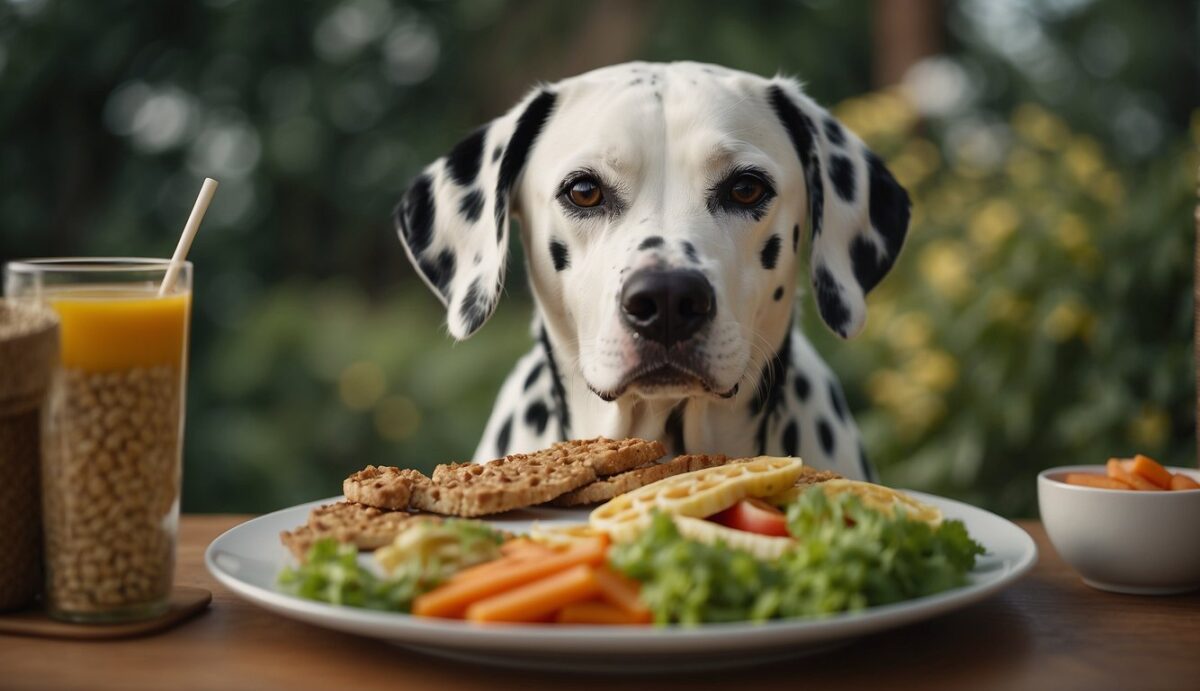
Understanding how to maintain your Dalmatian’s digestive health is crucial. These FAQs cover diet, potential risks, and symptom management.
What are the most suitable foods to promote a Dalmatian’s digestive health?
To promote digestive health in your Dalmatian, opt for high-quality dog food with readily digestible proteins, low purine content (like eggs and cottage cheese), and the right balance of fibers, which can aid in healthy bowel movements.
What should I avoid feeding my Dalmatian to prevent stomach issues?
Avoid giving your Dalmatian foods that are high in purines, such as red meats and certain fish, which can lead to urinary stones. Also, steer clear of foods that are toxic to dogs, such as chocolate, grapes, and onions.
How can I identify and address common gastrointestinal problems in Dalmatians?
If your Dalmatian shows signs of digestive distress, like vomiting, diarrhea, or loss of appetite, consult your vet promptly. A tailored diet and appropriate medication can manage many common GI issues.
What role does diet play in managing digestive health in Dalmatians?
Diet is crucial for managing your Dalmatian’s digestive health. Ensure the diet is appropriate for your dog’s age, size, and activity level, and includes specific nutrients that support GI tract health.
Which puppy foods are recommended for a Dalmatian’s digestive care?
For Dalmatian puppies, choose a formula specifically designed for large breed puppies. This food should support growth while being easy on the digestive system and low in purines to prevent urinary stones.
Are there any benefits to feeding raw food to a Dalmatian, and how does it affect their gastrointestinal health?
Some owners find a carefully planned raw diet can improve coat health and energy levels in Dalmatians.
However, it’s important to research and consult your vet, as raw diets can be risky if not balanced properly.

